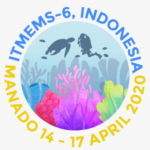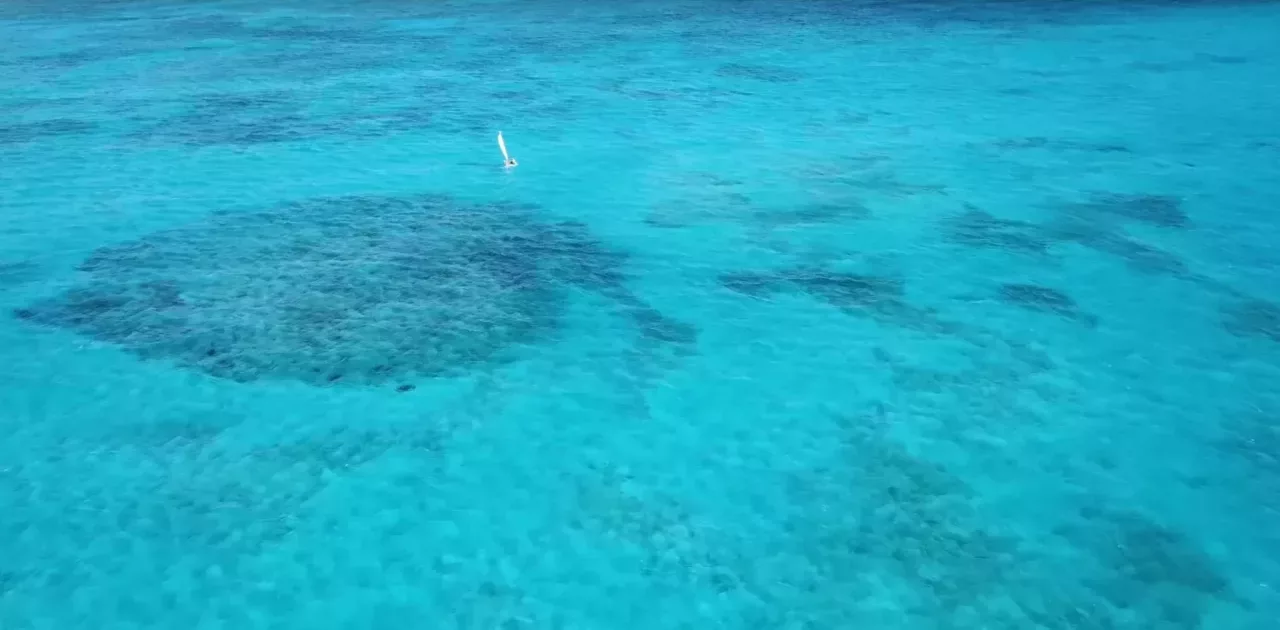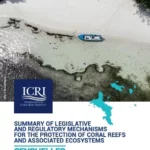The Government of Sweden granted a voluntary contribution to the ICRI Secretariat to support the implementation of the ICRI plan of action 2018-2020. The contribution was administrated by the Prince Albert II of Monaco Foundation on behalf of the ICRI Secretariat. The following tasks were implemented.
Summary of existing legislative and regulatory mechanisms for the protection of coral reefs and related ecosystems at the national level for ICRI  members countries
members countries
This work was conducted in the context of the implementation of the ICRI Plan of Action 2018-2020, and more particularly in the frame of the first theme, which is to “promote effective and adaptable solutions to improve the protection of coral reefs”. The aim of this project was to underline good practices in policies related to the protection of coral reefs. Those good practices are to be found in the legislation of the country, but also in the other means of implementation of the several international and regional instruments important in this issue. The purpose of the study is not to assess and evaluate the efficiency of the action of the country, but only to point out the positive elements collected and to identify the potential lacks. This was on ongoing activity from the previous Swedish contribution.
Two studies have been finalized for France (PDF file) and Seychelles (PDF file). Other national studies are being produced for Indonesia and Fiji. This work is also complementary to the recent ICR/UNEP study on “Analysis of global and regional policy instruments and governance mechanisms related to the protection and sustainable management of coral reefs“.
Contribution to the production of the “Status and Trends of Coral Reefs of the Pacific 2020”
Data collection, homogenization and cleaning processes for the 2020 GCRMN report
The project started in January 2019 with the creation of a standardised procedure for the homogenisation and cleaning of benthic data from different monitoring programs.
In parallel, several workshops were organised in the different GCRMN regions to explain the goal of the 2020 report and encourage collaborators to share their data.
- Workshop on regional data analysis of coral monitoring in the East Asia region
- Workshop on regional data analysis of coral reef monitoring in the Red Sea region
- Workshop on regional data analysis of coral reef monitoring in the Regional Organisation for the Protection of the Marine Environment (ROMPE) Sea Area (West Asia)
- Workshop on regional data analysis of coral reef monitoring in the South Asia Sea region
- Regional Workshop on regional data analysis of coral reef monitoring for the Wider Caribbean + GCRMN-Caribbean Steering Committee Meeting
Webinar
On January 7th, a webinar on the Status and Trends of Coral Reefs of the Pacific took place. The webinar was based on the Status and Trends of Coral Reef of the Pacific report which was released in September 2019 and is the first report of its kind from the Pacific and the third in a series of Global GCRMN) reports dedicated to describing the status and trends of the world’s coral reefs. Serge Planes, one of the report’s authors and Director of Research at the French National Center of Scientifique Research and Director of France’s Laboratory of Excellence (LabEx) CORAIL, discussed key findings from the new report Status and Trends of Coral Reefs of the Pacific and what the results mean for improving the management of Pacific reefs.
This was organized in collaboration with Open Communications for The Ocean (OCTO). The proceedings are available at https://reefresilience.org/status-and-trends-of-coral-reefs-of-the-pacific/.
Financing Coral Reef Conservation
Webinars
Following the successful workshop on “Innovative Finance for Coral Reefs” held in conjunction with the 33rd ICRI General Meeting (Monaco, December 2018), the ICRI Secretariat decided to continue its work on the topic. In that context, in collaboration with Conservation Finance Alliance (CFA) and Open Channels- Open Communication for The Ocean (OCTO), ICRI organized 3 webinars on the following topics:
- “Overview of innovative financing for coral reef conservation and management” (June 5th, 2019): https://reefresilience.org/finance-tools-for-coral-reef-conservation-an-overview/
- “Innovative financing for coral reef conservation and management: Tourism-related tools (July 17th, 2019): https://reefresilience.org/financing-coral-reef-conservation-and-management-with-tourism-related-tools/
- “Innovative financing for coral reef conservation and management: Trust funds and related activities” (October 2nd, 2019): https://reefresilience.org/financing-coral-reef-conservation-and-management-conservation-trust-funds-and-impact-investing/
Production of training material
13 decks of slides have been prepared by the Conservation Finance Alliance for the International Coral Reef Initiative, based on “Finance Tools for Coral Reef Conservation: A Guide,” 2018. The decks cover finance tools along with an introductory context-setting section. They can be used as one entire set, or in any combination. Each finance mechanism section can also be used as a stand-alone module.
- Entrance Fees
- Special Use Permits
- Concessions
- Green Taxes
- Payments for Ecosystem Services (PES)
- Biodiversity Offsets
- Nature Bonds
- Impact Bonds
- Debt for Nature Swaps
- Reef Insurance
- Conservation Enterprise Incubators
- Impact Investing
- Conservation Trust Funds
In addition to the 13 finance tools, some introductory slides were also created. Each deck includes a summary and detailed explanation of the main elements of the finance solution (mechanism), and one or two cases as examples. The material can be used by experienced conservation finance practitioners to provide training on these tools to coral reef and Marine Protected Areas managers.
Intended Audience
The training deck is designed to provide an introductory overview on finance mechanisms to protected area managers, government employees, conservation biologists, NGO staff and others working in the field of biodiversity conservation. It does not assume the audience has any prior experience in conservation finance or background in economics or finance. The training deck is not intended to serve as a detailed “how-to” guide on implementing any single mechanism, but rather to provide an introduction and give participants a framework for evaluating the suitability of different mechanisms to a specific conservation context.
Trainer Background
The slides have been designed with the assumption that the person conducting the training sessions has a well-informed to expert level understanding of the content, and as such should be able to teach the material with no more than a few hours of preparation. Each section has added detail in the notes section of the slides to provide additional context, clarification or examples. While case studies are provided to illustrate the use of the finance mechanism in a real-world setting, trainers are encouraged to use their own examples when possible.
Please note that the PowerPoint version of these training decks can be requested from the ICRI secretariat. We welcome any comments or suggestions you may have.
Contribution to the production of a report on the Live Reef Food Fish Trade
The report entitled The Live Reef Food Fish Trade: Undervalued, Overfished and Opportunities for Change was produced following a study on the Live Reef Food Fish Trade and was developed in close collaboration with the Government of Indonesia.
Twenty years ago, ICRI Partners set a goal to reduce adverse ecological and socio-economic impacts of trade in coral and coral reef species, eliminate unsustainable fishing practices and protect coral reefs and related ecosystems. Key findings of the report highlight several ongoing and some emerging concerns around the exploitation of reef resources, including overfishing, illegal, unregulated and unmonitored fishing and trade, and threats to several species and to coral habitat.
The report can be downloaded here.
Contribution to the 6th International Tropical Marine Ecosystems Management Symposium
 The International Tropical Marine Ecosystems Management Symposium (ITMEMS) is a core activity of ICRI and has been convened by ICRI Secretariats in 1998 (Australia), 2003 (Philippines), 2006 (Mexico), 2009 (Guadeloupe) and 2016 (Philippines), with the involvement and participation of ICRI members. It aims to develop and strengthen the capacities of coastal and marine managers and their partners to conserve and promote the sustainable use of coral reefs and related ecosystems.
The International Tropical Marine Ecosystems Management Symposium (ITMEMS) is a core activity of ICRI and has been convened by ICRI Secretariats in 1998 (Australia), 2003 (Philippines), 2006 (Mexico), 2009 (Guadeloupe) and 2016 (Philippines), with the involvement and participation of ICRI members. It aims to develop and strengthen the capacities of coastal and marine managers and their partners to conserve and promote the sustainable use of coral reefs and related ecosystems.
It was decided at the 33rd ICRI General Meeting, held in December 2018 in Monaco, that Indonesia would host ITMEMS 6. In order to share information about the 6th ITMEMS a dedicated website was created on the ICRI Forum (/events/itmems6/). This is where interested parties, participants and trainers could access up-to-date information. This included information about Manado (the region the symposium will be held in), detailed descriptions about the sessions (and their length), the trainers and their golden paragraphs, and the sponsors of ITMEMS 6.
Due to the outbreak of COVID-19 and the growing concerns for the well-being of the participants and trainers, as well as their families, the organisers of ITMEMS 6 have made the decision to postpone the symposium.
Contribution to the coral reef Community of Ocean Action
ICRI, with the UN Environment Programme, has been nominated as the Focal Point for the “Communities of Ocean Action (COA) – coral reefs” (https://oceanconference.un.org/coa/CoralReefs). In that context, ICRI needs:
- To follow-up on the implementation of the voluntary commitments, and if possible, evaluate their contribution toward the implementation of SDG 14.
In order to implement some of these tasks, the Secretariat worked with the CBD Secretariat on the organization of a workshop for the COA: Advancing Ocean Action towards SDG 14: Leveraging Synergies for Marine and Coastal Ecosystems, Mangroves and Coral Reefs held 11-13 November 2019 in Montreal, Canada, just before the thematic workshop on Marine and Coastal Biodiversity for the Post-2020 Global Biodiversity Framework (13-15 November, 2019).
The CBD Secretariat collaborated with the Global Ocean Biodiversity Initiative and various experts to put together a compendium of short background briefs to support the discussions of 2020 Ocean Pathways Week, including the CBD thematic consultation on marine and coastal biodiversity for the post-2020 global biodiversity framework. ICRI and UNEP were invited to draft the brief on “coral reef conservation and management”. The briefs were designed to provide very useful background to support the discussions in the context of planning for the 2020 UN Ocean Conference and the CBD deliberations on the post-2020 global biodiversity framework.
- To promote the Communities of Ocean Action (COA) – coral reefs.
- To catalyse and generate new voluntary commitments.
- To facilitate collaboration and networking amongst different actors in support of SDG 14, and share information (e.g. upcoming events, ICRI/UNEP publications/guidelines, newsletter etc).
- To contribute to the preparation of the next UN Ocean Conference in June 2020.
Since 2017, the Swedish government has made a yearly financial contribution to the ICRI Secretariat in order to implement the ICRI plan of Action.
- Report for the Swedish contribution (2017)
- Report for the Swedish contribution (2018)




 members countries
members countries